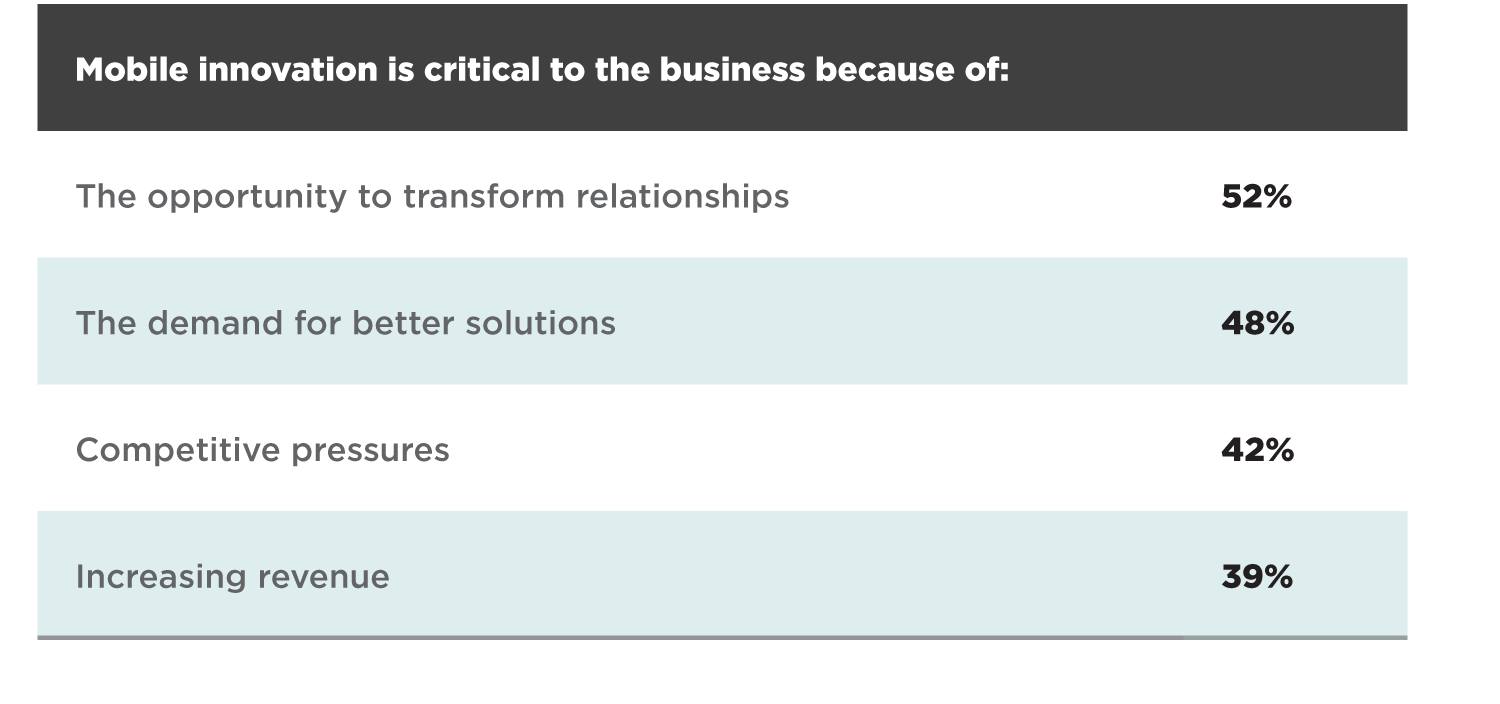Mobile Initiatives Transforming Enterprises in 2013
Appcelerators survey of 770 enterprise leaders and their mobile development priorities and perceptions of the emerging trends in mobility are – in. The report allows enterprises to compare their mobile initiatives with those of their peers to better understand the major mobile trends emerging in the enterprise space.
..while a FULL Report can be found here.
The skinny is..
- 2013 will be the year when the number of new mobile apps will surpass the number of new desktop apps.
- Enterprises view mobile as transformative and believe it will have substantive impact on top line revenue growth, customer and employee relationships, the enterprise’s ability to compete, and bottom line asset efficiency. However, many enterprises are struggling with decentralized mobile application strategies and a lack of internal mobile leadership.
(This is where having a mobile strategist on your side would help)
- Most enterprises have created their first mobile app, and the majority of enterprises are targeting to build 5 or more mobile apps in 2013.
- None of the major traditional IT and software vendors are showing leadership in mobile, leaving the enterprise to take the reins themselves. However, few enterprises have made the organizational investments necessary to be successful.
- Enterprises state that they are planning to build employee-facing mobile apps in 2013, and also believe that user experience matters as much for B2E/ B2B as it does for B2C apps.
..Phew. Still with me? Ok.
So, basically the report suggests that enterprises believe that mobile provides the opportunities to change everything under the sun. Whether it be: new ways to motivate employees, new ways to connect with customers, or just new business models.
Mobile App Development to Outpace Desktop and Web Development.
72% of surveyed enterprises believe it is “likely” or “very likely” that mobile development will outpace web and desktop development in 2013. Not only that, 87% of respondents said that more apps will be delivered than desktop apps in the next year.
While this is certainly possible, respondents fear that none of the major IT vendors (Microsoft, SAP, Oracle, IBM, and HP) are showing leadership in the mobility space.
Microsoft leads with a meager 28.3% while the rest are: 15.8% for SAP, 10.8% for Oracle, 7.3% for IBM, and 4.6% for HP.
The App Floodgates have been opened.
61.5% of enterprises have built and launched 2 apps already. 10.8% of those surveyed claim that their company plans to build more than 20 apps in 2013. 80% of enterprises leaders also predict that mobile-first companies will risrupt mature industries in 2013, with 55% of these companies ranking mobility at the top or near the top of their list of strategic priorities.
(They must have a great mobile marketing strategist)
Despite the high prioritization of mobility and recognition to the bottom line few companies are actually treating it as strategic priority. The few, the smart, the proud, however, HAVE established a centralized body for the oversight of these mobile projects. Although, even fewer are adding mobile-specific job titles to their payrolls.
iOS and Android Reign as Top Enterprise Platforms.
As seen in the image below, most enterprises (80.1%) are “very interested” in developing for iPhone and 79% are “very interested in developing for iPad tablets. Android interest is also still relatively high. 64.4% saying they’re “very interested in developing apps for android phones, and 52.4% for android tablets.
UE/UX Top Priority.
85.6% of surveyors stayed that their user experience is just as important for B23 and B2B apps as it is for B2C apps. Clearly, all signs point to a world where beauty,functionality, and user delight triumph – regardless of the end user.
B2E (Employee Facing) Mobile Apps Starting to take off.
66% of surveyors state their companies are planning to build employee-facing apps in 2013.
On a final note..
Less than half of the companies surveyed have a comprehensive mobile strategy.
44% have a comprehensive mobile strategy, 22% are unclear on the business case for one, 30% lack time or resources.
Respondents stated the biggest obstacles in creating and implementing a mobile strategy were: 54% resources, 41% lack of tech standards, 26.5% lack of clear direction or strategy.
99% Lack of a mobile marketing strategy expert.
That’s all for now.




![chart-platform-interest-comparison[1]](http://mobileminute.info/wp-content/uploads/2013/01/chart-platform-interest-comparison1.png)





It’s always a pleasure to hear from smooene with expertise.